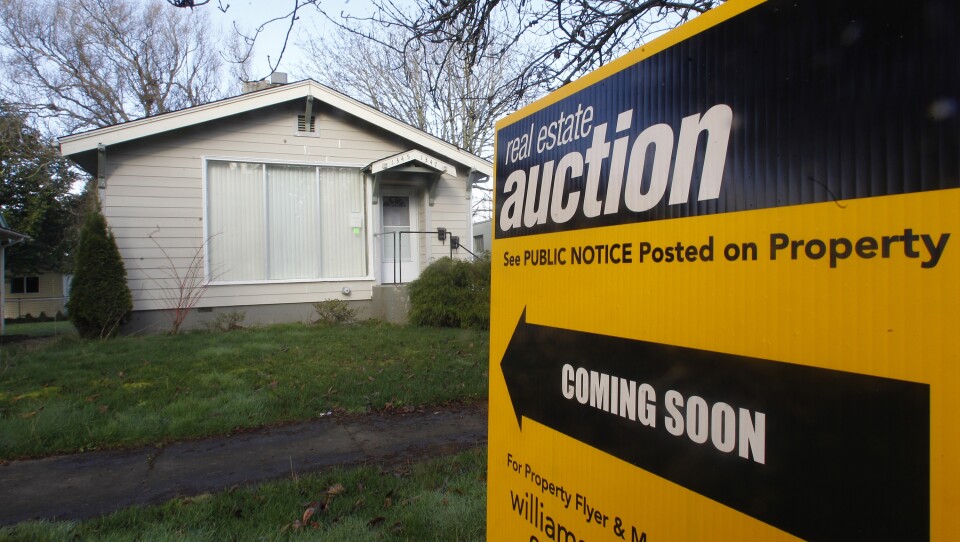 FILE - This Feb. 23, 2012, photo shows a auction sign in front of a home, in Salem, Ore. Legislation intended to help homeowners facing foreclosure appears to be dead, with both Republicans and Democrats saying negotiations have broken down. Lawmakers from both parties say they disagreed about the role that financial counselors should play in the foreclosure process and whether borrowers should be able to force their lender into mediation.
FILE - This Feb. 23, 2012, photo shows a auction sign in front of a home, in Salem, Ore. Legislation intended to help homeowners facing foreclosure appears to be dead, with both Republicans and Democrats saying negotiations have broken down. Lawmakers from both parties say they disagreed about the role that financial counselors should play in the foreclosure process and whether borrowers should be able to force their lender into mediation.
Rick Bowmer AP

May 26, 2023
Updated May 29, 2023
Cities and towns in Massachusetts and across the nation no longer will be able to foreclose on a person’s home and automatically take all the profits, according to a new U.S. Supreme Court ruling released on Thursday.
The decision struck down a lower court ruling that allowed a county in Minnesota to foreclose on an elderly woman's condominium because she owed $15,000 in property taxes — and let the county keep all the profits from a $40,000 sale of the home.
The Supreme Court determined that the county could foreclose on the property to settle the tax bill, but that keeping profits beyond what is owed violate constitutional protections against unjust taking of a property without fair compensation. Once the tax bill is paid, the court ruled that any remaining funds from a sale belong to the former owner.
The decision was welcomed by housing advocates and others in Massachusetts who have long criticized the practice. A recent study by the Libertarian Pacific Legal Foundation found homeowners in 30 cities and towns in Massachusetts collectively lost an estimated $97 million in equity through foreclosure over a six-year period.
John Rao, a senior attorney with the National Consumer Law Center based in Boston, said the ruling will stop what he described as "equity theft in tax foreclosures.” Rao has long been a critic of the practice.
“Hopefully, it will also encourage municipalities and private investors to work on better solutions to help homeowners avoid tax sales and the loss of their homes,” he said.
RELATED STORIES
Homeowners Sold Out By Cities? Investors Buy Tax Liens And Foreclose
Foreclosures have cost Massachusetts homeowners nearly $100 million in equity since 2014
Across Massachusetts, shrouded corporations are scooping up single-family homes
Paul Meaney of Worcester told GBH News that the ruling will offer protections to homeowners like him. Meaney almost lost four properties several years ago after failing to pay water and sewer bills in a misunderstanding with the city.
“I think it is fair and equitable and just,’’ Meaney said about the top court’s ruling. “It is egregious that cities and towns can profit from people’s hardship.”
Worcester is one of 20 municipalities in Massachusetts that engage in a practice related to what the high court ruled against: selling the liens for delinquent taxes or utility bills to third-party companies, which then turn around and foreclose on the homes.
The process has been criticized for providing an incentive for cities and towns to stack the odds against homeowners who have fallen behind on taxes. City leaders have argued the auctions are an effective way for cash-strapped cities to get needed funding from delinquent homeowners.
A major contention is the fact that tax lien foreclosures allow municipalities and investors to take everything, including equity.
Meaney ended up saving his properties but says state and city officials should do more to educate homeowners about the risks of not paying even a small bill.
“I was able to spend a lot money and fight them and get my houses back,’’ he said. “But a lot of people can’t do that.”
Todd Kaplan of Greater Boston Legal Services says advocates have long fought to make improvements to protect homeowners in the state Legislature but have made little progress. He said now what needs to be done is justice for those who already lost their homes. His office is supporting a Worcester woman who is fighting the sale of her home to a private company over $2,600 in unpaid real estate taxes.
“The decision confirms something we already know, that this has been an incredibly unjust and unconstitutional process where people who are house rich and cash poor are having their homes stolen from them by municipalities,’’ he said. “The logical fall out from this decision is Massachusetts is going to have to change the way tax foreclosures happen.”
Separator
GBH News reporter Sam Turken contributed to this report.

Jenifer B. McKim is a deputy investigative editor at the GBH News Center for Investigative Reporting. She focuses on social justice issues, including criminal justice, child welfare, sex trafficking and personal debt for print, digital and broadcast.

